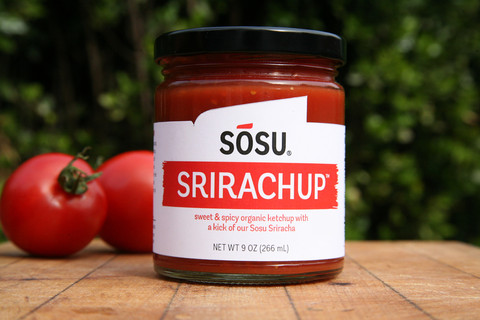Ketchup: You Complete Me
The tomato-based ketchup you know and love is a wholly American invention. But before it was made from tomatoes, which are native to the Americas, ketchup-like sauces made from offbeat ingredients like walnuts, oysters and pickled fish brine were common across Asia.
The sauce worked its way across several continents before arriving in Philadelphia in the 18th century, where it was reinvented as a rough sauce made from unripe tomato scraps (no thanks). It wasn't until 1876 that Henry J. Heinz perfected the recipe that bears his name, which is to this day the No. 1 ketchup on the market, to the tune of 650 million bottles a year. (Fun fact: During production, Heinz tests its ketchup for viscosity. If the liquid exits the bottle faster than .028 miles per hour, the iconic glass bottle is rejected for sale.)
But thanks to the all-things-artisan movement, the ketchup giant is getting some heat from a bevvy of new players. Check out the contenders:
True Made Foods: Infused with spinach, carrots and butternut squash, True Made Foods' ketchup is the first that you can douse on your burger while pretending you're eating your veggies. The two founders bonded over kids (five between them) and the desire to trim a few pounds. According to cofounder Kevin Powell, the USDA has warned them about calling their product "ketchup," because it contains too many vegetables.
How it tastes: Thick in texture, it tastes of a blend of fresh vegetables—not just tomato—which makes it versatile enough for everyday use.
Catskill Provisions: Claire Marin is a self-professed ketchup lover who wanted to make an updated version without all the preservatives, sodium and high-fructose corn syrup. Her goals were simple: better ingredients, same flavor. The final recipe uses just one sweetener, honey from Marin's beehives.
How it tastes: A dark red sauce with a balanced vinegar and tomato taste, plus a rich honey finish.
We Love Jam: At first, Eric Haeberli, cofounder of We Love Jam, was using store-bought ketchup in his barbecue sauce. But then he found a source for organic tomato paste and thought, How hard can this be? Well, it took about two years and hundreds of variations, but he finally got the recipe just right. It's a good thing he stuck with it, because ketchup is now the brand's third best seller, behind apricot and blackberry walnut jam. We like the Spicy Berbere, a blend of East African spices that includes fenugreek, nigella seed and several different peppers.
How it tastes: Thick and bright red with a unique umami finish.
Sosu Srirachup: The key to great tasting ketchup, Lisa Murphy, founder of Sosu Sauces, says, is using ripe tomatoes. In fact, she uses almost one and a half pounds of ripe Early Girl tomatoes in her special blend of ketchup and srirachup. Because of that, it's made just once a year when the vegetable is in season. To finish, Murphy adds in her own house-made Sriracha, and, for good measure, a few chile peppers. Her sweetener of choice: brown sugar.
How it tastes: Thin and bright but with a great depth that evokes your favorite Asian foods.
First Field Roasted Jersey Ketchup: Though many people extol the bounty of California produce (drought be damned), the founders of First Field have two words for you—New Jersey. They make their ketchup from local tomatoes, organic spices, a hint of molasses and East Coast love.
How it tastes: A thick roasted dark sauce that lets its tomatoes shine through, with a faintly spicy finish.
Originally published for Tasting Table.
.

